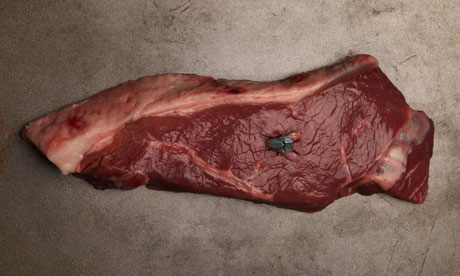
As if being obese didn't already carry enough social stigma. Now, it seems, you're not just killing yourself by being overweight, but you're killing the planet, too.
With more than a passing nod to TV's Life on Mars, a new study published in the International Journal of Epidemiology examines what the UK's energy consumption would be if the average weight of the population was returned to how it was in the 1970s. The study found that due to the increased number of people today who are overweight, the UK consumes 19% more food than it did 40 years ago, which equates to an extra 60 mega tonnes of greenhouse gas emissions a year. It also included the extra transport-related emissions caused by the increased obesity.
"This is not really just about obese people, the distribution of the whole population is what's important," said Dr Phil Edwards, the study leader and researcher at the London School of Hygiene and Tropical Medicine. "Everybody is getting a bit fatter. Staying slim is good for health and for the environment."
Personally, I've always found the body mass index (BMI) a rather crude system for measuring obesity (so much emphasis is placed on height, for example), but the study makes the point that the average male BMI in England between 1994 and 2004 rose from 26 to 27.3. For women it rose from 25.8 to 26.9 which equates to an extra half a stone (about 3kg). That's some rise in just one decade, let alone four. Furthermore, it is estimated that 40% of Britons will be classified as obese by 2010.
I guess it's not that much of a surprise, though: in the west, we typically live ever more sedentary lifestyles where we let fossil fuels do the work for us instead of troubling our own muscles. In addition, we eat more and more processed foods.
But the fat finger of blame seems to be directed at our ever-increasing meat consumption. It's certainly not a secret that the global livestock herd is causing considerable damage to the environment, as was first widely publicised in the UN Food and Agriculture Organization's "Livestock's Long Shadow" report in 2006. It's also certainly true that you rarely, if ever, see an obese environmentalist, but that might have more to do with the higher-than-average chance that they're vegan, which is not a diet that seems to ever threaten one's waistline.
But for me the most interesting aspect of the study is that it shows how the obesity debate is now starting to be analogous to how the smoking debate ended up playing out. At first, being overweight – like smoking - was labelled as being something that was damaging to just you. The attitude was: if you want to eat or smoke yourself to an early grave then be my guest. But now being overweight is increasingly being seen as a selfish act in which – as with the effects of passive smoking - you are not just having a negative impact on yourself but also those around you, be it through increased healthcare costs (both through overall taxation and rising insurance premiums) or, as is now being claimed, increased environmental costs.
Will this now mean that future carbon taxes and regulations place a disproportionate burden on the overweight and obese? And, by extension, will those who remain underweight benefit from the much-predicted "polluter pays" society where the carbon cost is embedded into everything we do or buy? It's something to chew on.

